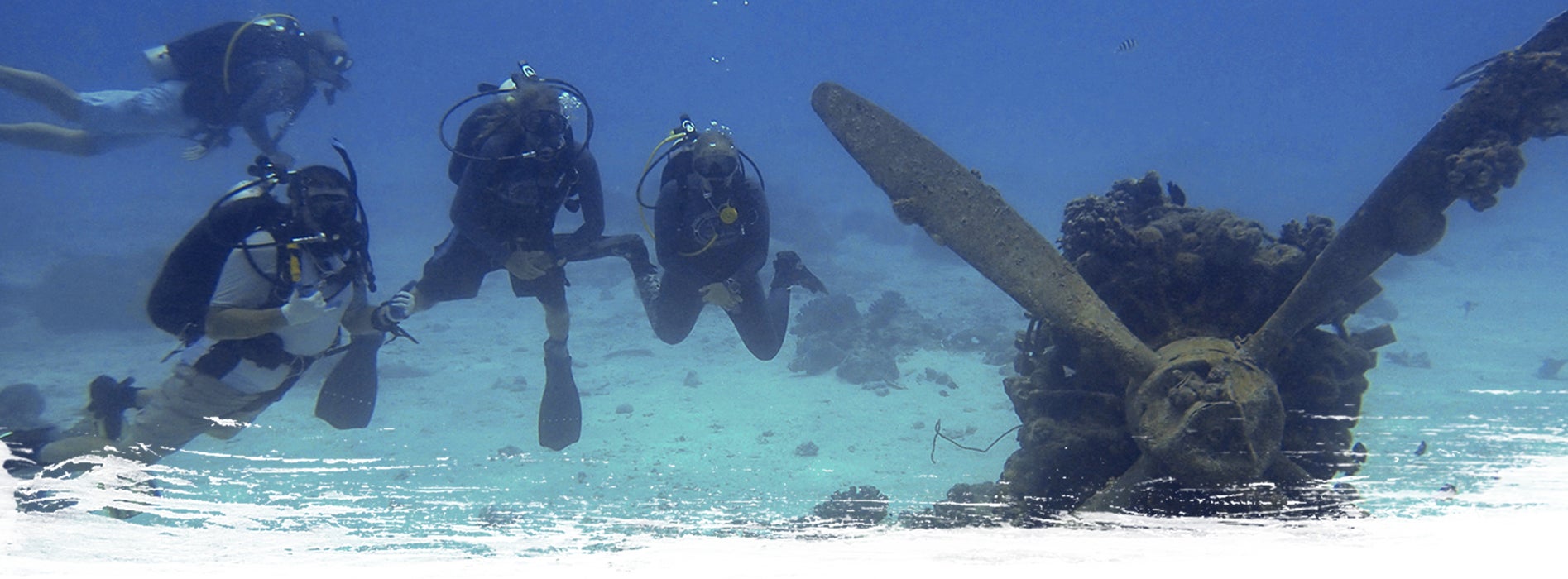TRIAL AND ERROR
Graduate students learning to become better archaeologists, divers on Saipan trip
Our Saipan field school has been underway for the past few days. Professors and graduate students in the East Carolina University Program in Maritime Studies have settled into a routine. At 7 a.m. each day we travel to our base in Smiling Cove Marina, and then it’s a short boat ride to our project sites in Tanapag Lagoon. We conduct surveys until 3 p.m. then come back to our hotel to de-salt ourselves and post-process data.
While our ECU team looks like a well-oiled machine now, it took some trial and error to get there. On the first day of conducting a sonar survey, a wave overcame the 7-meter-long black rubber boat and flooded some of our not-so-waterproof computers. Thankfully, there were other computers available to replace the flooded ones. On my first day of conducting a metal detector survey at one of our project sites, my dive buddy and I forgot the necessary 30-meter measuring tape, but instead got a short 15-meter tape, so we had to return to the boat to get the appropriate length tape. Each mistake has taught us what not to do, what to do, and how to do it better.

ECU graduate student Aleck Tan runs a metal detector over an object while Dr. Nathan Richards supervises. (Contributed photo)
This field school has been a great learning experience. In a classroom, one can learn all he or she can about how to conduct circle searches or run metal detector surveys, but it is another thing to actually do the work in the ocean where conditions are different. The current moves you away from survey lines, you might get scratched by coral, the sun might beat down harshly on already sunburnt skin, and you might constantly sweat through your shirt and smell like you haven’t washed it in three days. With every challenge, we have learned how to become better archaeologists and divers. Most importantly, the challenges and new experiences have taught us to go with the flow with a bright and shining positive mental attitude.
At the end of the day, our team crowds into a makeshift conference room where we talk about our day and plan for the next day. In our meetings, we also talk about another important topic – where to eat dinner. Food has been one of the highlights of the trip as it reminds me of home.
While Saipan is a thousand miles away from my home in North Carolina, it feels like home for me. As a Filipino immigrant, I was born and raised in the Philippines, where afternoon showers, mangoes and water activities are common. Being geographically close to the Philippines, Saipan is similar in weather and even in culture as Saipan has a very close relationship with the Philippines. Since the 16th century, Filipino migrants have been traveling and bringing their culture and food to Saipan.
Being on an island similar to my birthplace has made the study abroad experience easier to adapt to but also more exciting. While work days are long and nights are filled with post-processing, a lot of duct tape, and discussions of people’s spirit animals, our team looks forward to exploring more of Tanapag Lagoon.
-by Aleck Tan, graduate student
